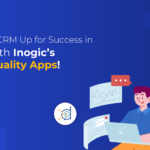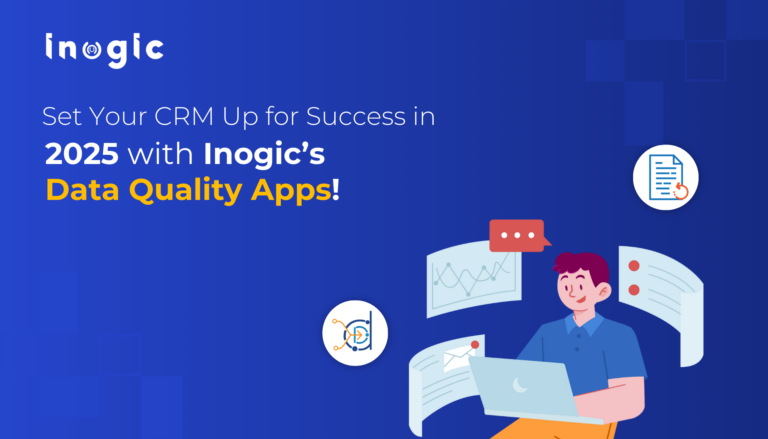In today’s dynamic business landscape, where customers have more choices than ever before, building strong and lasting relationships with them has become a paramount goal for organizations of all sizes. These relationships aren’t just transactions; they are the cornerstone of brand loyalty, repeat business, and positive word-of-mouth recommendations.
At Gestisoft, we understand the profound impact that strong customer relationships can have on your business’s success. That’s why we’re excited to share with you a comprehensive guide on how to leverage Microsoft Dynamics Customer Relationship Management (CRM) to build and nurture these essential connections.
Microsoft Dynamics CRM isn’t just another software solution; it’s a powerful tool that empowers businesses to centralize customer data, gain valuable insights, and personalize interactions at scale. In this article, we’ll explore the best practices and tips for harnessing the full potential of Microsoft Dynamics CRM to create meaningful and lasting customer relationships.
Whether you’re new to CRM or looking to enhance your existing strategies, our goal is to provide you with actionable insights and guidance that will enable you to cultivate stronger bonds with your customers. So, grab a coffee, get comfortable, and let’s embark on a journey to unlock the magic of Microsoft Dynamics CRM in building customer relationships that stand the test of time.
Understanding the Significance of Customer Relationships:
Before we dive into the intricacies of Microsoft Dynamics CRM and its best practices, it’s essential to grasp the significance of building strong customer relationships in the contemporary business landscape.
In today’s digitally-driven world, customers aren’t just looking for products or services; they’re seeking meaningful interactions and personalized experiences. They want to connect with brands that understand their needs, value their loyalty, and actively engage with them.
Strong customer relationships offer a plethora of benefits:
Customer Loyalty: when customers feel a genuine connection with your brand, they’re more likely to remain loyal, even in the face of competition.
Repeat Business: satisfied customers are inclined to make repeat purchases, contributing to consistent revenue streams.
Positive Referrals: happy customers become brand advocates, recommending your products or services to their networks.
Valuable Feedback: building relationships allows you to gather valuable feedback, which can guide product/service improvements and innovation.
Increased Customer Lifetime Value: Long-term customer relationships often translate into higher lifetime value, as customers continue to engage and transact over time.
Building strong customer relationships isn’t just about enhancing revenue; it’s about creating a community of loyal supporters who believe in your brand’s mission and values. It’s about turning one-time buyers into lifelong partners.
Microsoft Dynamics CRM plays a pivotal role in helping businesses achieve this goal. It provides the tools and insights needed to foster meaningful connections, deliver personalized experiences, and guarantee that no customer falls through the cracks.
“Discover how Microsoft Dynamics CRM can enhance your customer relationship management with its comprehensive, seamless solution.” But first, let’s uncover the capabilities and advantages of Microsoft Dynamics CRM in the next section.
The Role of Microsoft’s CRM:
Now that we’ve established the critical role of customer relationships, let’s delve into how Microsoft Customer Relationship Management (CRM) can be your trusted ally in this endeavour.
Microsoft Dynamics CRM is more than just software; it’s a dynamic platform designed to centralize and streamline all aspects of customer interactions, data management, and relationship building. With Microsoft Dynamics CRM, you’re not merely managing transactions; you’re nurturing valuable connections.
Here are some key aspects of Microsoft Dynamics CRM and its role in building strong customer relationships:
Centralized Customer Data: Microsoft Dynamics CRM acts as a centralized repository for all customer-related information. From contact details and communication history to purchase records and preferences, it provides a 360-degree view of each customer. This comprehensive view empowers your team to understand customers better, anticipate their needs, and tailor interactions accordingly.
Streamlined Communication: effective communication is at the heart of any successful relationship. Microsoft Dynamics CRM offers tools to streamline communication within your organization. Teams can collaborate seamlessly, share customer insights, and make sure that everyone is on the same page when engaging with customers.
Personalization at Scale: building strong customer relationships requires personalization. With Microsoft Dynamics CRM, you can segment your customer base and deliver personalized messages, offers, and recommendations. This level of personalization makes customers feel valued and understood.
Automation for Efficiency: while personalization is crucial, automation plays a vital role in managing routine tasks and workflows. Microsoft Dynamics CRM allows you to automate follow-ups, reminders, and other repetitive processes, freeing up your team to focus on meaningful customer interactions.
Insights and Analytics: Data-driven decision-making is key to nurturing customer relationships. Microsoft Dynamics CRM offers strong reporting and analytics for understanding customer behaviour and trends. These insights guide your strategies and help you make informed decisions.
Integration with Other Tools: Microsoft Dynamics CRM seamlessly integrates with other Microsoft 365 applications, creating a unified ecosystem for productivity, communication, and CRM. This integration makes sure that your team has the right information at the right time, enhancing customer interactions.
Microsoft Dynamics CRM is your partner in building, maintaining, and strengthening customer relationships. It empowers you to provide exceptional customer experiences, understand your customers deeply, and nurture connections that go beyond transactions.
In the following sections of this article, we’ll explore the best practices and tips for leveraging Microsoft Dynamics CRM to its fullest potential in your quest to build strong customer relationships.
Discover 8 reasons to Use CRM Software for your Business Now !
Maximizing the Benefits of Microsoft Dynamics CRM:
Having discussed the primary function of Microsoft Dynamics CRM in managing customer relationships, let’s explore further ways to optimize its advantages and drive your business towards greater success. Microsoft Dynamics CRM isn’t just a tool; it’s a dynamic platform meticulously crafted to empower your organization in the art of building and nurturing strong, enduring customer relationships.
Here’s an in-depth exploration of how you can extract the utmost value from Microsoft Dynamics CRM:
1. Beyond Contact Management:
While Microsoft Dynamics CRM provides robust contact management capabilities, its scope extends far beyond that. It acts as a central repository for all customer interactions, enabling you to not only manage basic contact information but also comprehensively track communications, transactions, and customer preferences. This holistic view is the foundation for building lasting connections.
2. Leverage Additional CRM Features:
Delve into the rich tapestry of features that Microsoft Dynamics CRM offers. Beyond the essentials, you’ll discover a treasure trove of tools designed to elevate your customer relationship management. Features like lead scoring help you prioritize prospects. Opportunity tracking provides insights into sales pipelines, and customer journey mapping unveils the path your customers take.
3. Align with Business Goals:
To maximize the benefits of Microsoft Dynamics CRM truly, align its utilization with your overarching business goals. Define clear objectives for customer relationship management that resonate with your organization’s mission and vision. When CRM strategies are tailored to your unique objectives, the results become more impactful.
4. Embrace Data-Driven Decision-Making:
One of the crowning jewels of Microsoft’s CRM is its reporting and analytics capabilities. These tools empower you to make data-driven decisions with confidence. Monitor essential key performance indicators (KPIs) related to customer relationships, such as customer acquisition costs, retention rates, and customer satisfaction scores. The insights gained become the compass guiding your strategies.
5. Ensure User Adoption:
Microsoft Dynamics CRM shines brightest when embraced by your team. Make sure that your employees aren’t just familiar with the platform but are proficient in using it effectively. Comprehensive training and ongoing support are key to fostering a culture where CRM is an integral part of daily operations.
6. Integrate Across Departments:
Break down silos and foster collaboration between departments such as sales, marketing, and customer service. Microsoft Dynamics CRM seamlessly integrates with other tools and applications within the Microsoft 365 ecosystem, creating a unified approach to customer relationship management. This cohesion guarantees that every customer interaction is consistent and aligned with your brand’s values.
7. Tailor CRM for Your Unique Needs:
Flexibility is one of Microsoft’s CRM’s core strengths. Customize the platform to align perfectly with your distinct business processes and customer relationship goals. Whether you require specific workflows, custom fields, or unique reports, Microsoft Dynamics CRM can be tailored to fit your requirements like a bespoke suit.
8. Embrace Automation:
Embracing automation liberates your team from the burden of routine tasks and workflows. Microsoft Dynamics CRM offers automation capabilities that guarantee nothing falls through the cracks. Automated follow-ups, reminders, and notifications allow your team to invest their energy in what truly matters—building and nurturing meaningful customer relationships.
9. Keep Up with Updates:
Microsoft is committed to enhancing its CRM solutions regularly. Stay informed about updates and new features. By keeping your Microsoft Dynamics CRM environment up-to-date, you make sure that your organization benefits from the latest advancements, providing a competitive edge in your customer relationship management efforts.
10. Seek Expert Guidance:
Consider partnering with seasoned experts like Gestisoft, who bring a wealth of experience in implementing and optimizing Microsoft Dynamics CRM for diverse business needs. Expert guidance can be the catalyst for unlocking the full potential of the platform, ensuring that every facet of your customer relationships is finely tuned for success.
In the following segments, we will explore further and offer practical advice and effective strategies that will enable you to establish and maintain strong and long-lasting customer connections through the powerful features of Microsoft Dynamics CRM.
Customer Segmentation Strategies:
In the realm of customer relationship management, one size rarely fits all. Each customer is unique, with their own preferences, behaviours and needs. Recognizing this diversity and tailoring your approach accordingly is where the art of customer segmentation comes into play. With Microsoft Dynamics CRM as your trusted companion, mastering customer segmentation becomes an achievable endeavour.
1. Defining Customer Segments:
The journey to effective customer segmentation begins by defining the criteria that will shape your segments. These criteria can encompass a wide range of factors, including demographics (age, gender, location), psychographics (lifestyle, values, interests), purchase history, engagement level, or any other attributes that align with your business goals and customer relationships.
2. Gathering and Organizing Data:
Microsoft’s CRM acts as the custodian of your customer data. It’s here that you gather and organize information about your customers. Ensuring that customer profiles are complete with accurate details is essential for effective segmentation. The more you know about your customers, the more precise your segments can be.
3. Creating Segmentation Rules:
Within the realm of Microsoft Dynamics CRM, you wield the power to create segmentation rules that align with your predefined criteria. These rules serve as the guiding hand that automatically categorizes customers into their respective segments. For instance, you might establish a segment for “High-Value Customers” based on their purchase history and frequency.
4. Personalized Communications:
Armed with well-defined segments, your next move is to personalize your communications. Recognize that each segment has distinct needs and interests. Leverage the power of Microsoft Dynamics CRM to craft personalized messages, offers, and recommendations. Show your customers that you understand and appreciate their uniqueness.
5. Targeted Marketing Campaigns:
With segments at your disposal, create targeted marketing campaigns that speak directly to each group’s preferences and pain points. By integrating with marketing automation tools, Microsoft Dynamics CRM enables you to create and implement campaigns that effectively connect with different groups, resulting in a higher level of involvement and conversion rates.
6. Analyze and Refine:
Effective segmentation is an evolving journey. Continuously track the performance of your segmented strategies within Microsoft Dynamics CRM. Analyze key metrics such as engagement rates, conversion rates, and customer satisfaction scores within each segment. These insights are the compass that guides your refinement efforts, ensuring your approach stays aligned with customer expectations.
7. Dynamic Segmentation:
Take your segmentation strategy to the next level by considering dynamic segmentation within Microsoft Dynamics CRM. Dynamic segments adapt in real-time based on changing customer behaviours and characteristics. This guarantees that your interactions remain relevant and impactful over time, even as your customer base evolves.
8. Predictive Analytics:
Explore the realm of predictive analytics offered by Microsoft Dynamics CRM. Predictive models can help you forecast future customer behaviours, enabling you to proactively address their needs and preferences. This forward-looking approach positions you to stay one step ahead in your customer relationship management efforts.
9. Customer Journey Mapping:
Combine the power of segmentation with customer journey mapping to create personalized and meaningful customer journeys for each segment. Understand the touchpoints, channels, and interactions that matter most to each group. This holistic view allows you to orchestrate seamless and engaging experiences.
By mastering the art of customer segmentation with Microsoft Dynamics CRM, you’re not merely dividing your customer base; you’re crafting personalized experiences that resonate deeply with each group. It’s a dynamic strategy that transforms one-size-fits-all interactions into tailored engagements, laying the foundation for strong and lasting customer relationships.
Moving forward, we will explore in greater depth the development of a customer-focused environment and the effective handling of customer input, which are essential in fostering connections with your segmented customer demographics.
Creating a Customer-Centric Culture:
Effective customer relationship management goes beyond the capabilities of software; it’s about nurturing a customer-centric culture within your organization. In a customer-centric culture, every aspect of your business revolves around the needs, preferences, and experiences of your customers. It’s a commitment to deliver exceptional value and satisfaction at every touchpoint.
Here’s a deeper dive into how you can foster and sustain a customer-centric culture, with Microsoft Dynamics CRM as your guiding star:
1. Leadership Commitment:
Building a customer-centric culture begins with an unwavering leadership commitment. Your organization’s leaders must not only endorse but embody customer-centricity. When leadership places customers at the forefront of decision-making, it sends a powerful message throughout the organization.
2. Employee Training and Empowerment:
Equip your team with the knowledge and skills they need to excel in a customer-centric environment. Comprehensive employee training, including proficiency in Microsoft Dynamics CRM, ensures that your staff is well-prepared to meet customer expectations.
3. Customer-Focused KPIs:
Define key performance indicators (KPIs) that revolve around customer satisfaction, loyalty, and retention. Monitor these KPIs within Microsoft Dynamics CRM to assess the effectiveness of your customer-centric initiatives. Make sure your entire team understands the impact of their actions on these metrics.
4. Customer Feedback Loop:
Establish a robust feedback loop using Microsoft Dynamics CRM to capture, analyze, and act upon customer feedback. Encourage customers to provide input on their experiences, and use this invaluable information to drive improvements in products, services, and processes. A proactive approach to feedback demonstrates that you value your customers’ opinions.
5. Cross-Functional Collaboration:
Break down silos within your organization by fostering cross-functional collaboration. Microsoft Dynamics CRM serves as a shared platform that centralizes customer data and communication history, making it easier for teams to collaborate seamlessly. This guarantees that every customer touchpoint remains coherent and aligned with your brand’s values.
6. Empathy and Active Listening:
Cultivate a culture of empathy and active listening. Encourage your team to genuinely understand customer needs, preferences, and concerns. Microsoft Dynamics CRM allows you to capture and reference customer interactions, providing valuable context for each engagement.
7. Celebrating Customer Successes:
Recognize and celebrate customer success within your organization. Acknowledge and reward employees who go above and beyond to create outstanding customer experiences. Microsoft Dynamics CRM helps you track and highlight these successes, reinforcing the importance of customer-centric actions.
8. Continuous Improvement:
Emphasize a culture of continuous improvement in your customer-centric approach. Regularly assess and adapt your customer relationship strategies based on feedback, emerging trends, and the evolving needs of your customers. Microsoft Dynamics CRM provides the data and insights needed to drive these improvements.
9. Transparency and Communication:
Maintain transparency in your interactions with customers. Keep them informed about relevant updates, changes, and improvements. Microsoft Dynamics CRM can help in managing and automating customer communications, ensuring that information flows smoothly.
10. Customer-Centric Innovation:
-Encourage innovation that directly benefits your customers. Use Microsoft Dynamics CRM to capture insights and ideas from employees and customers alike, driving product and service enhancements that address real customer pain points.
A customer-centric culture isn’t just a buzzword; it’s a commitment to a way of doing business that places customers at the center of every decision and action. With Microsoft Dynamics CRM as your ally, you have the tools and capabilities to empower your team and create a culture where customer satisfaction isn’t just a goal but a guiding principle.
In the sections that follow, we will delve into the art of managing customer feedback effectively, integrating it seamlessly into your customer-centric culture, and fostering trust and loyalty among your segmented customer groups.
Effective Customer Feedback Management:
On the journey to building and nurturing strong customer relationships, feedback is your compass. Customer feedback provides invaluable insights into their experiences, preferences, and pain points. Effectively managing this feedback is essential for continuous improvement and guaranteeing that your customers feel heard and valued.
Here’s how to master the art of customer feedback management with the assistance of Microsoft Dynamics CRM:
1. Collect Feedback at Every Touchpoint:
Utilize Microsoft Dynamics CRM to collect feedback at various touchpoints in the customer journey. Whether it’s post-purchase surveys, website feedback forms, or social media interactions, capturing feedback from multiple channels provides a holistic view of customer sentiment.
2. Automated Feedback Requests:
Streamline the feedback collection process by automating feedback requests within Microsoft Dynamics CRM. Trigger requests based on specific customer interactions or transaction milestones. Automation ensures that you consistently gather input from your customers.
3. Centralized Feedback Repository:
Microsoft Dynamics CRM acts as a centralized repository for all customer feedback. This consolidated view allows your team to track, analyze, and respond to feedback more efficiently. You can also categorize feedback by themes or issues to identify recurring trends.
4. Prompt and Personalized Responses:
Acknowledge feedback promptly and with a personalized touch. Microsoft Dynamics CRM enables you to categorize feedback and assign it to relevant team members for follow-up. Timely and personalized responses demonstrate your commitment to addressing customer concerns.
5. Analyze and Extract Insights:
Leverage Microsoft Dynamics CRM’s reporting and analytics capabilities to extract actionable insights from customer feedback. Identify common pain points, areas for improvement, and trends in customer sentiment. These insights inform strategic decisions and improvements.
6. Closed-Loop Feedback:
Implement a closed-loop feedback system using Microsoft Dynamics CRM. This means following up with customers who provided feedback to let them know how their input was used to drive positive changes. It fosters a sense of partnership and demonstrates that you value their input.
7. Share Feedback Internally:
Share customer feedback within your organization to ensure that all departments are informed and aligned. Microsoft Dynamics CRM facilitates the dissemination of feedback data, enabling cross-functional teams to collaborate on improvements.
8. Continuous Improvement:
Use the insights gained from customer feedback to drive continuous improvement initiatives. Whether it’s refining products, enhancing services, or optimizing processes, the goal is to address customer pain points and enhance their experiences.
9. Feedback as a Customer Retention Tool:
Leverage positive feedback as a customer retention tool. Highlight testimonials and positive reviews in your marketing materials to build trust with potential customers. Microsoft Dynamics CRM can help you identify and showcase these success stories.
10. Proactive Feedback Solicitation:
Go beyond passive feedback collection by proactively seeking input from customers. Use Microsoft Dynamics CRM to schedule follow-up calls or surveys to gather feedback on specific experiences or new initiatives.
Effective customer feedback management transforms customer input into a catalyst for positive change. It demonstrates your commitment to continuous improvement and makes sure that your customers have a voice in shaping their experiences. With Microsoft Dynamics CRM as your ally, you have the tools and processes needed to excel in this essential aspect of relationship building.
In the final sections of this article, we will explore the integration of customer feedback seamlessly into your customer-centric culture and how to foster trust and loyalty among your segmented customer groups, cementing your reputation as a trusted partner.
Fostering Trust and Loyalty:
Trust and loyalty are the cornerstones of enduring customer relationships. To become a trusted partner, you must consistently demonstrate reliability, empathy, and a genuine commitment to your customers’ success. Microsoft Dynamics CRM plays a pivotal role in helping you foster trust and loyalty among your segmented customer groups.
Here’s how you can cultivate these essential qualities with Microsoft Dynamics CRM by your side:
1. Consistent Communication:
Use Microsoft Dynamics CRM to maintain consistent communication with your customers. Regular updates, newsletters, and personalized messages keep your brand top of-mind and show that you value their engagement.
2. Reliable Service Delivery:
Reliability is the bedrock of trust. Ensure that you consistently deliver on your promises, whether it’s meeting deadlines, providing quality products, or offering exceptional service. Microsoft Dynamics CRM can help you track and manage customer commitments.
3. Personalization at Scale:
Microsoft Dynamics CRM enables you to personalize interactions with customers, even as you scale your operations. Leverage customer data and segmentation to tailor your communications and offerings, making each customer feel uniquely valued.
4. Prompt Issue Resolution:
When issues arise, address them promptly and efficiently. Microsoft’s CRM case management capabilities allow you to track and resolve customer inquiries and concerns in a timely manner.
5. Proactive Problem-Solving:
Go beyond issue resolution by proactively identifying and addressing potential problems. Use Microsoft Dynamics CRM to analyze customer data and anticipate their needs, offering solutions before they ask.
6. Loyalty Programs and Rewards:
Implement loyalty programs and rewards using Microsoft Dynamics CRM. Recognize and reward loyal customers with exclusive offers, discounts, or early access to new products or services. These initiatives reinforce your commitment to their satisfaction.
7. Educational Resources:
Provide educational resources and content that empower your customers. Use Microsoft Dynamics CRM to track their preferences and interests, delivering content that aligns with their needs.
8. Customer Advocacy Programs:
Identify and nurture customer advocates within your segmented groups. Encourage them to share their positive experiences and refer others to your brand. Microsoft Dynamics CRM can help you identify potential advocates based on their interactions and satisfaction levels.
9. Regular Feedback and Engagement:
Maintain an ongoing dialogue with your customers. Solicit their feedback, inquire about their evolving needs, and keep them engaged. Microsoft Dynamics CRM’s communication tools facilitate these interactions.
10. Transparency and Honesty:
Always operate with transparency and honesty. If issues arise, communicate openly about the steps you’re taking to resolve them. Building trust often involves admitting mistakes and showing a commitment to making things right.
Fostering trust and loyalty is an ongoing journey, and Microsoft Dynamics CRM provides the infrastructure to support your efforts. With a consistent, customer-centric approach, you can cultivate strong, lasting relationships that extend beyond transactions.
In the concluding sections of this article, we’ll bring together all the elements we’ve discussed, highlighting the holistic approach to building strong customer relationships with the magic of Microsoft Dynamics CRM.
Bringing It All Together: building Strong Customer Relationships with Microsoft Dynamics CRM
As we reach the culmination of our journey, it’s time to synthesize the key elements that comprise the art of building strong customer relationships with Microsoft Dynamics CRM. Our exploration has revealed the power of this dynamic platform, and now we unite the threads of our discussion to unveil a holistic approach.
1. The Foundation: Microsoft Dynamics CRM as Your Trusted Partner
Microsoft Dynamics CRM isn’t just software; it’s your trusted partner in the pursuit of customer relationship excellence. Its adaptability and comprehensive capabilities make it the cornerstone of your strategy.
2. Maximizing the Benefits:
To fully harness the potential of Microsoft Dynamics CRM, you must look beyond contact management and explore its extensive feature set. Align your CRM strategies with your business objectives and embrace data-driven decision-making.
3. Customer Segmentation:
Customer segmentation with Microsoft Dynamics CRM is the art of personalization at scale. Tailor your interactions and communications to each group’s unique needs and preferences, ensuring that you’re always relevant and resonant.
4. Cultivating a Customer-Centric Culture:
A customer-centric culture is the bedrock of strong relationships. It starts with leadership commitment, employee empowerment, and a commitment to transparency and empathy. Microsoft Dynamics CRM supports this cultural shift.
5. Effective Customer Feedback Management:
Feedback is your compass, and Microsoft Dynamics CRM serves as the conduit for capturing, analyzing, and acting upon it. Use feedback to drive continuous improvement and demonstrate your commitment to customer voices.
6. Fostering Trust and Loyalty:
Trust and loyalty are your ultimate goals. Microsoft Dynamics CRM helps you achieve them through consistent communication, reliability, personalization, and a commitment to solving problems and delivering exceptional service.
Incorporate these elements into your customer relationship management strategy, and you’ll wield the magic of Microsoft Dynamics CRM to build strong, lasting customer relationships.
But this is just the beginning.
Are you ready to embark on the journey of transforming your customer relationships?
Contact Gestisoft today to discover how we can help you unlock the full potential of Microsoft Dynamics CRM, making the impossible happen, and turning transactions into lifelong partnerships.









